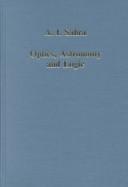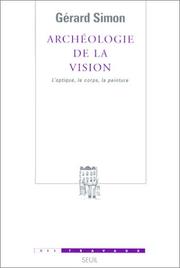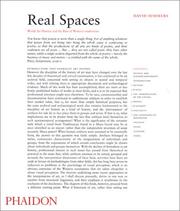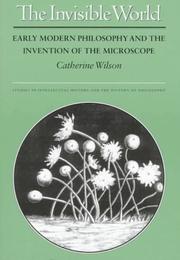| Listing 1 - 9 of 9 |
Sort by
|
Book
Year: 1970 Publisher: [Karachi] : Hamdard Academy,
Abstract | Keywords | Export | Availability | Bookmark
 Loading...
Loading...Choose an application
- Reference Manager
- EndNote
- RefWorks (Direct export to RefWorks)
Alhazen, --- Congresses.
Book
ISSN: 11474920 ISBN: 9782711629343 2711629341 Year: 2020 Publisher: Paris : Librairie philosophique J. Vrin,
Abstract | Keywords | Export | Availability | Bookmark
 Loading...
Loading...Choose an application
- Reference Manager
- EndNote
- RefWorks (Direct export to RefWorks)
Curieux de l’évolution de sa discipline, les neurosciences de la vision, l’auteur s’est intéressé aux différents moments qui ont jalonné l’émergence des principales théories de la perception visuelle. En remontant cette histoire de l’Antiquité au Moyen Âge, on rencontre de grands savants, philosophes, médecins, mathématiciens. Notamment un génie arabe né à Bassorah (Irak actuel) au tournant du dixième siècle, Al-Hassam ibn al-Haytham (965-1039). Auteur d’une oeuvre scientifique considérable, il compose, à l’ombre de la mosquée al-Azhar du Caire, un ouvrage majeur, le Kitāb al-Manāẓir, ou Livre de l’Optique. Inconnu jusqu’à la fin du treizième siècle, ce livre exercera une influence décisive sur les doctrines de la vision au cours des siècles suivants. L’œuvre d’Ibn al-Haytham marque une rupture radicale, lumière et vision, indissociables dans l’Antiquité, sont désormais séparées : l’œil n’illumine plus les objets, il en reçoit la lumière qu’ils réfléchissent. Cette découverte rendit possible les théories modernes initiées par Képler au début du XVIIe siècle.C’est cette page brillante de la science arabe que cet ouvrage se propose de raconter. Que connaissait Ibn al-Haytham de ses prédécesseurs (Aristote, Euclide, Galien, et Ptolémée notamment)? En quoi sa contribution propre a-t-elle été une véritable révolution scientifique? Quelle en fut la réception dans l’Occident chrétien?
Vision --- Medicine, Arab --- History --- Alhazen, --- Perception visuelle --- Médecine arabe. --- Histoire médiévale. --- Perception visuelle. --- Vision. --- Histoire. --- Ibn al-Hayṯam, al-Ḥasan ibn al-Ḥasan --- Influence. --- Vision - History --- Alhazen, - 965-1039 --- Alhazen, 965-1039

ISBN: 0860784355 Year: 1994 Volume: CS444 Publisher: Aldershot : Variorum,
Abstract | Keywords | Export | Availability | Bookmark
 Loading...
Loading...Choose an application
- Reference Manager
- EndNote
- RefWorks (Direct export to RefWorks)
Science --- Arab countries --- History --- Optics --- Astronomie arabe --- Astronomy, Arab --- Sciences --- Optique --- Histoire --- Alhazen,
Book
Year: 1970 Publisher: Karachi
Abstract | Keywords | Export | Availability | Bookmark
 Loading...
Loading...Choose an application
- Reference Manager
- EndNote
- RefWorks (Direct export to RefWorks)
Mathematics --- Astronomy --- History of physics --- Human medicine --- Alhazen --- Ibn Al-Haitham, A.

ISBN: 2020580918 9782020580915 Year: 2003 Publisher: Paris : Seuil,
Abstract | Keywords | Export | Availability | Bookmark
 Loading...
Loading...Choose an application
- Reference Manager
- EndNote
- RefWorks (Direct export to RefWorks)
Vision --- Visual perception --- Perception visuelle --- Philosophy --- History --- Philosophie --- Histoire --- Optics --- Perspective. --- Visual perception. --- Optics and art. --- Art, Ancient. --- History. --- Ptolemy, --- Alhazen, --- Philosophy. --- Optics - History. --- Optique --- Philosophie. --- Histoire.
Book
ISBN: 9782840663843 2840663848 Year: 2010 Publisher: [Lyon] : [Dijon] : PUL Les presses du réel,
Abstract | Keywords | Export | Availability | Bookmark
 Loading...
Loading...Choose an application
- Reference Manager
- EndNote
- RefWorks (Direct export to RefWorks)
Perspective --- Optics --- Art, Renaissance --- Aesthetics, Comparative --- Alhazen, --- Renaissance --- Optique --- Alhazen, - 965-1039 --- Ibn al-hayṯam, al-ḥasan ibn al-ḥasan (0965?-1039). kitāb fī al-manāẓir --- Art et sciences --- Art de la renaissance --- Influence --- Influence arabe

ISBN: 0714842443 Year: 2003 Publisher: London Phaidon
Abstract | Keywords | Export | Availability | Bookmark
 Loading...
Loading...Choose an application
- Reference Manager
- EndNote
- RefWorks (Direct export to RefWorks)
kunstfilosofie --- History --- kunstgeschiedenis --- beeldcultuur --- Aesthetics of art --- philosophy of art --- art history --- esthetica --- aesthetics --- Kunstgeschiedenis ; en opkomst van modernisme --- Post-Formalisme --- 7.01 --- Kunst ; theorie, filosofie, esthetica --- Art and society. --- Art --- Space (Art) --- Historiography. --- History. --- David Summers --- kunst --- kunsttheorie --- formalisme --- postformalisme --- politiek --- kunst en politiek --- ruimte --- ruimtelijkheid --- virtualiteit --- virtuele realiteit --- virtual reality --- factuur --- materiaal --- Navajo's --- Indianen --- hogans --- gender studies --- Afrika --- Jeruzalem --- oudheid --- Sumer --- Egypte --- piramides --- Angkor --- China --- Beijing --- peking --- Versailles --- Maya's --- Shiva --- Lepinski Vir --- votiefbeelden --- ikonen --- maskers --- theater --- renaissance --- narratologie --- naturalisme --- prehistorie --- vlakken --- tweedimensionaliteit --- rasters --- kaarten --- cartografie --- schilderkunst --- perspectief --- isometrie --- licht --- optica --- Alhazen --- Brunelleschi Filippo --- metaoptica --- metaopticaliteit --- romantiek --- realisme --- karikatuur --- landschap --- landschapsschilderkunst --- Rothko Mark --- 7.03 --- Space (Art). --- Art and society --- Art and sociology --- Society and art --- Sociology and art --- Historiography --- Social aspects --- Negative space (Art) --- History as a science --- Art history --- History of art --- historiografie van de kunstgeschiedenis

ISBN: 0691034184 0691017093 9780691017099 Year: 1995 Publisher: Princeton : Princeton University Press,
Abstract | Keywords | Export | Availability | Bookmark
 Loading...
Loading...Choose an application
- Reference Manager
- EndNote
- RefWorks (Direct export to RefWorks)
In the seventeenth century the microscope opened up a new world of observation, and, according to Catherine Wilson, profoundly revised the thinking of scientists and philosophers alike. The interior of nature, once closed off to both sympathetic intuition and direct perception, was now accessible with the help of optical instruments. The microscope led to a conception of science as an objective, procedure-driven mode of inquiry and renewed interest in atomism and mechanism. Focusing on the earliest forays into microscopical research, from 1620 to 1720, this book provides us with both a compelling technological history and a lively assessment of the new knowledge that helped launch philosophy into the modern era. Wilson argues that the discovery of the microworld--and the apparent role of living animalcula in generation, contagion, and disease--presented metaphysicians with the task of reconciling the ubiquity of life with human-centered theological systems. It was also a source of problems for philosophers concerned with essences, qualities, and the limits of human knowledge, whose positions are echoed in current debates about realism and instrument-mediated knowledge. Covering the contributions of pioneering microscopists (Leeuwenhoek, Swammerdam, Malpighi, Grew, and Hooke) and the work of philosophers interested in the microworld (Bacon, Descartes, Leibniz, Malebranche, Locke, and Berkeley), she challenges historians who view the abstract sciences as the sole catalyst of the Scientific Revolution as she stresses the importance of observational and experimental science to the modern intellect.
Philosophy and science --- Philosophy, Modern --- Microscopes --- Philosophie et sciences --- Philosophie --- History --- Histoire --- Europe --- Intellectual life --- Vie intellectuelle --- -Philosophy and science --- -Philosophy, Modern --- -Modern philosophy --- Science and philosophy --- Science --- Light microscopes --- Microscope and microscopy --- Optical microscopes --- Optical instruments --- -History --- -Europe --- Council of Europe countries --- Eastern Hemisphere --- Eurasia --- Filosofie. --- Microscopie. --- Philosophie. --- Naturwissenschaften. --- Philosophie des sciences. --- Philosophy --- 1600-1699. --- History. --- -Microscopes --- 17th century --- Philosophy [Modern ] --- Philosophy and science - Europe - History - 17th century. --- Microscopes - Europe - History - 17th century. --- Naturwissenschaften --- Mikroskop --- Philosophy, Modern - 17th century. --- Philosophieren --- Philosoph --- Philosophin --- Lichtmikroskop --- Optisches Instrument --- Naturforschung --- Naturlehre --- Naturwissenschaft --- Wissenschaft --- Naturwissenschaftler --- Accademia dei Lyncei. --- Alhazen. --- Bacon, Francis. --- Berkeley, George. --- Book of Nature. --- Collegium Curiosae. --- Copernicus. --- Digby, Kenelm. --- Divini, Eustachio. --- Fournier, Marian. --- Gregory. --- Hippocrates. --- Hutchison, Keith. --- Jungius, Joachim. --- Lucretius. --- Nero. --- Pasteur, Louis. --- air pump. --- ammalcula. --- analogy. --- atomism. --- bacteria. --- butterfly. --- caterpillar. --- charlatanry. --- corpuscularianism. --- dissection. --- effluvia. --- empiricism. --- experimentation. --- eyeglasses. --- fermentation. --- generation. --- gonorrhea. --- heliocentrism. --- iatromechanism. --- idealism. --- influenza. --- insects. --- knowledge, scientific. --- laboratory. --- lenses. --- magic. --- mathematics. --- mechanism. --- metamorphosis. --- myopia. --- mysticism. --- objectivity. --- occasionalism. --- ovism. --- pananimism. --- protozoa. --- qualities. --- MICROSCOPY --- MONOGRAPHS --- PHILOSOPHY AND SCIENCE --- HISTORY
Book
ISBN: 0691234639 Year: 1973 Publisher: Princeton, New Jersey : Princeton University Press,
Abstract | Keywords | Export | Availability | Bookmark
 Loading...
Loading...Choose an application
- Reference Manager
- EndNote
- RefWorks (Direct export to RefWorks)
Beginning with Jung's earliest correspondence to associates of the psychoanalytic period and ending shortly before his death, the 935 letters selected for these two volumes offer a running commentary on his creativity. The recipients of the letters include Mircea Eliade, Sigmund Freud, Esther Harding, James Joyce, Karl Kernyi, Erich Neumann, Maud Oakes, Herbert Read, Upton Sinclair, and Father Victor White.
Psychoanalysts --- Jung, C. G. --- A priori and a posteriori. --- Alfred Kubin. --- Alhazen. --- Analytical psychology. --- Anthroposophy. --- Archetype. --- Arthur Schopenhauer. --- Book of Revelation. --- British Psychoanalytical Society. --- Carl Jung. --- Categorical imperative. --- Christian Knorr von Rosenroth. --- Christiana Morgan. --- Code word (figure of speech). --- Confessio Amantis. --- Confucius. --- Consciousness. --- Creative Evolution (book). --- Critical philosophy. --- De Coelesti Hierarchia. --- Docetism. --- Education. --- Emil Kraepelin. --- Emma Jung. --- English poetry. --- Epigram. --- Eranos. --- Ernst Kretschmer. --- Erwin Rohde. --- Eugen Bleuler. --- Ezra Pound. --- Foras. --- G. (novel). --- George Ripley (transcendentalist). --- God Knows (novel). --- God. --- Guglielmo Ferrero. --- Heinrich Zimmer. --- Helton Godwin Baynes. --- Henri Bergson. --- Herbert Read. --- Herbert Silberer. --- Hermann Broch. --- Individuation. --- Jacob Burckhardt. --- Jakob Lorber. --- James Oppenheim. --- Johann Peter Eckermann. --- Juvenal. --- Karl Barth. --- Laurence Sterne. --- Lecture. --- Libido. --- Ludwig Binswanger. --- Ludwig Klages. --- M. R. James. --- Mahayana. --- Martin Heidegger. --- Master of the World (novel). --- Max Scheler. --- Meister Eckhart. --- Mendelian inheritance. --- Mysterium Coniunctionis. --- Neoplatonism. --- Neurosis. --- Niels Bohr. --- Nominalism. --- Of Education. --- Paracelsus. --- Paul Brunton. --- Philosophy. --- Profession. --- Psychoanalysis. --- Psychology and Alchemy. --- Psychology. --- Psychotherapy. --- Puritans. --- Religion. --- Ronald Coase. --- Rudolf Steiner. --- Samuel Hahnemann. --- Scholasticism. --- Sigmund Freud. --- Soziologie. --- Subjectivism. --- Superiority (short story). --- Sutra. --- Symbole. --- Søren Kierkegaard. --- Taoism. --- Theology. --- Thomas Aquinas. --- Thought. --- Thus Spoke Zarathustra. --- Transcendentalism. --- Urizen. --- Victor White (priest). --- Vladimir Nabokov. --- Wilhelm Fliess. --- Wissenschaft.
| Listing 1 - 9 of 9 |
Sort by
|

 Search
Search Feedback
Feedback About UniCat
About UniCat  Help
Help News
News